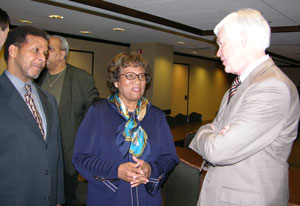 |
Former U.S. Surgeon General Joycelyn Elders, M.D., center, talks with College of Public Health Dean Jay Noren, M.D., right, and UNMC Associate Director of Health Disparities David Grandison, Ph.D. |
Poverty, difficulty navigating the health care system and a general lack of education are three common elements that typically accompany major health disparities, said Dr. Elders, who served as U.S. Surgeon General from 1993 to 1994 under then President Bill Clinton.
From improving sex education to using lunch programs to teach proper nutrition, Dr. Elders said much can be done in our nation’s schools to help alleviate health disparities.
“I’ve always been a proponent of education,” Dr. Elders said. “You hear talk about the ‘medical home’ concept of care. But what better medical home is there than our schools?”
While serving as surgeon general, Dr. Elders gained notoriety — and was harshly criticized — for being outspoken about sex education, particulary her support of distributing condoms in schools and promoting masturbation.
At a 1994 United Nations conference on AIDS, Dr. Elders said that perhaps masturbation should be promoted as a means of keeping young people from engaging in high-risk sexual behavior.
Her remarks, which came in response to a reporter’s question about promoting masturbation, sparked outrage, particularly among conservative factions in the United States, which eventually led Clinton to ask Dr. Elders to resign.
Almost 13 years later, Dr. Elders said she looks back at the controversy with a degree of satisfaction that her comments started a national dialogue about sex education.
Dr. Elders said she’s still in favor of teaching students about sexual protection and alternatives to risky behavior, particularly with unplanned pregnancies and sexually-transmitted diseases running rampant in U.S. communities experiencing the most severe health disparities.
“They called me the ‘condom queen’ because I talked about distributing condoms in schools,” Dr. Elders said. “Well if everyone who needed to used a condom, I would happily wear that crown. I’d sleep in it.”
Dr. Elders also noted that poor nutrition is a major culprit in many communities where health disparities exist. Children in such communities often don’t understand proper nutrition, she said.
Improving the quality of food in school lunch programs could help teach such children about proper nutrition, Dr. Elders said.
If children gain quality health education in their schools, she said, it stands to reason that they will take what they learned into their own homes.
“If we teach our children,” Dr. Elders said, “many of them will go home and teach their parents.”